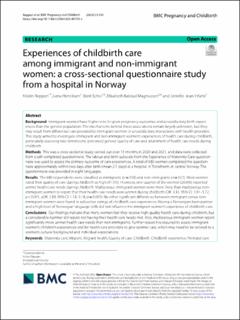Experiences of childbirth care among immigrant and non-immigrant women: a cross-sectional questionnaire study from a hospital in Norway
Reppen, Kristin; Henriksen, Lena; Schei, Berit; Magnussen, Elisabeth Balstad; Infanti, Jennifer Jean
Peer reviewed, Journal article
Published version
Permanent lenke
https://hdl.handle.net/11250/3077011Utgivelsesdato
2023Metadata
Vis full innførselSamlinger
Sammendrag
Background Immigrant women have higher risks for poor pregnancy outcomes and unsatisfactory birth experi- ences than the general population. The mechanisms behind these associations remain largely unknown, but they may result from differential care provided to immigrant women or unsatisfactory interactions with health providers. This study aimed to investigate immigrant and non-immigrant women’s experiences of health care during childbirth, particularly assessing two dimensions: perceived general quality of care and attainment of health care needs during childbirth.
Methods This was a cross-sectional study carried out over 15 months in 2020 and 2021, and data were collected from a self-completed questionnaire. The labour and birth subscale from the Experience of Maternity Care question- naire was used to assess the primary outcome of care experiences. A total of 680 women completed the question- naire approximately within two days after birth (mean 2.1 days) at a hospital in Trondheim, in central Norway. The questionnaire was provided in eight languages.
Results The 680 respondents were classified as immigrants (n = 153) and non-immigrants (n = 527). Most women rated their quality of care during childbirth as high (91.5%). However, one-quarter of the women (26.6%) reported unmet health care needs during childbirth. Multiparous immigrant women were more likely than multiparous non- immigrant women to report that their health care needs were unmet during childbirth (OR: 3.31, 95% CI: 1.91–5.72,
p < 0.001, aOR: 2.83, 95% CI: 1.53–5.18, p = 0.001). No other significant differences between immigrant versus non- immigrant women were found in subjective ratings of childbirth care experiences. Having a Norwegian-born partner and a high level of Norwegian language skills did not influence the immigrant women’s experience of childbirth care.
Conclusions Our findings indicate that many women feel they receive high-quality health care during childbirth, but a considerable number still report not having their health care needs met. Also, multiparous immigrant women report significantly more unmet health care needs than non-immigrants. Further research is required to assess immigrant women’s childbirth experiences and for health care providers to give optimal care, which may need to be tailored to a woman’s cultural background and individual expectations.

